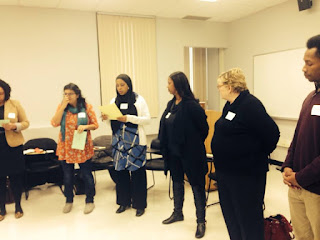Real Talk: Engaging Diversity through Transformational Intergroup Dialogue
While human social diversity is present everywhere in our society, most people recognize that they sometimes experience challenges in communicating to individuals from groups which vary from their own. Real Talk provides a supportive environment for individuals to explore common, though sometimes difficult, issues that often contribute to intergroup misunderstanding and conflict, especially when not addressed.
Unfortunately, most people are used to engaging in discussions or debates around intergroup conflicts, not dialogues. Dialogues are focused on building connections between individuals through deep, reflective exchanges focused on understanding rather than competing or winning an argument. By having groups share their real, authentic and honest thoughts and feelings about their identity, participants are able to explore both commonalities and differences with others and find ways to promote collective problem-solving and decision-making.
Unlike diversity education programs which are geared towards teaching individuals to either focus on the positive, to be politically correct or owning their privileges, transformational intergroup dialogue helps individuals assume responsibility for communicating with the real individuals in the room, not societal representations. As part of the learning process, participants engage in activities that promote constructive conflict and invite the sharing of personal challenges and triumphs in intergroup exchanges and relationships.
The dialogues can be transformative because individuals have an opportunity to review how some of their past thinking and behaviors about groups have been reflective of individual biases and prejudices. New knowledge and emotions can result from the dialogue when people choose to base their relationships in their new reality and overcome their past fears.
Foundations of Transformational Intergroup Dialogue
Transformational Intergroup Dialogue draws from two well-known and successful models for promoting democratic dialogue, action and civic engagement in the context of diversity: (a) the Michigan Intergroup Relations Model (http://www.igr.umich.edu/), a process used by the University of Michigan and universities throughout the United States to promote intergroup dialogue and engagement in higher education and community settings; and (b) Transformational Social Therapy (http://www.institut-charlesrojzman.com/fr), a process used internationally to promote knowledge sharing and collaborative action involving diverse parties in municipalities, civil society, educational settings, and other public arenas. Both models are informed by the theory and practice of multicultural citizenship and theory and research on learning and equitable social change in the context of diversity. Transformational Social Therapy’s grounding in depth psychology and critical social theory complements the Michigan Model by contributing a more robust understanding of the ways human needs and social structures interact and influence intergroup behavior.
The Michigan Model advances the idea that bringing divergent groups together to dialogue about important issues of social identity enhances intergroup understanding and societal relations. One of the key aspects of the intergroup dialogue process is the honest, open sharing of thoughts, emotions and conflicts, not just by the subordinated, but also the dominant groups. Intergroup dialogue creates a space for the most genuine, often unspoken, issues to be communicated for growth of the group and individual. The goals of intergroup dialogue include the development of a critical consciousness about social identity, social power, group identity and intergroup conflict.
Real Talk Dialogues
Real Talk Dialogues occur in various formats and can focus on several identities simultaneously or a single social identity. The Real Talk Symposium offers several dialogues concurrently either in a half-day or full day format. The Real Talk Symposium provides an excellent opportunity for an organization or community to expose their members to several dialogues within one day. For example, a typical Real Talk Symposium will offer the opportunity for a person to participate in a 3 hour race dialogue in the morning and a 3 hour class dialogue in the afternoon.
There are also Real Talk Dialogue Series which offer the opportunity for individuals to explore a social identity in-depth over an extended period of time. For example, a Real Talk Race Dialogue can be offered for 2-3 hours once per week over 5 consecutive weeks. This allows for a group to explore race (or gender, class, religion, etc) on a weekly basis by covering a broad range of issues within the content area and provide depth to the dialogue based on an individual group's expressed needs.
Trained Facilitators
Each dialogue is supported by experienced, trained facilitators who guide the dialogue process. The facilitators' goals are as follows:
- To engage participants in sharing their thoughts, feelings and experiences
- To encourage meaningful, deep exchanges and thoughtful, constructive conflict
- To guide the dialogue process by asking questions of participants related to the expression of thoughts, ideas and emotions with other group members
- To facilitate experiential learning among group participants by creating exercises which help participants to express their true feelings and thoughts
- To ensure that the dialogue is meeting the needs of each participant throughout the process







